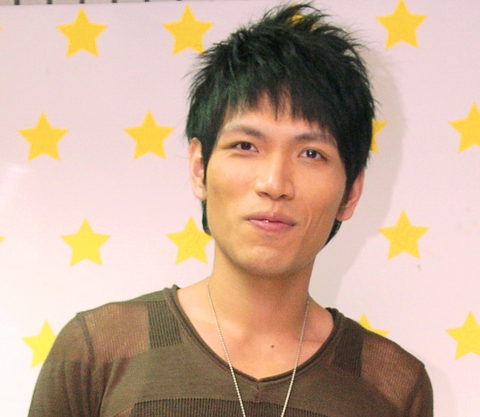It is amazing to see how the entertainment apparatus turns a nobody into a star and its efficiency to produce, consume and cash in on its creations is flabbergasting. Right now the machine is working its magic on Aska Yang (楊宗緯), its latest product. A local version of China's Li Yuchun (李宇春), Yang rocketed to stardom after participating in the singing contest One Million Star (超級星光大道), on national TV. Two months on, the college student-turned-household name keeps the nation enthralled with no more than a reasonably nice voice and a bent for getting teary eyed over defeated contenders.
Nicknamed cry baby for his tears and caveman for his rugged appearance, Yang has quickly become the gossip rag's new favorite as paparazzi digs out dirt saying the contestant once flunked out of college, subtracted five years from his real age and has developed a predilection for young, pretty assistants.
The show has been accused of deliberately eliminating Yang from the competition so that it can invite him back later in the game, adding a bit of suspense and drama to the show even as the star in the making ensures that gossip fodder is in ample supply.

PHOTO: TAIPEI TIMES
The Aska craze is predicted to reach a climax in a couple of months as Yang and the nine other finalists, now dubbed as the Million Star Gang (星光幫), are working on their first compilation album slated to hit the market in the summer. Whether or not the gang are successful products like Hello Kitty or Jolin Tsai (蔡依林), only time will tell.
In other tabloid news, A-mei (阿妹) is said to have developed a fancy for younger men as a widely circulated picture of her nestling up to Super Basketball League player He Shou-cheng (何守正) is interpreted as a sign of budding love by local media proficient in making gossip headlines out of nothing.
As the rumored romance comes suspiciously close to the release date of the star's new album next month, and one cannot but wonder whether the record company is getting a bit slack in resorting to a publicity gimmick that is so yesterday.

PHOTO: TAIPEI TIMES
Pop singer and entertainer Alan Luo (羅志祥) is apparently in the prime of his life. Not only does his romantic pursuit of the queen of cute Rainie Yang (楊丞琳) look promising, the business-savvy star has set up his own clothing brand and his first flagship store opened last weekend in Ximending (西門町).
Over 600 fans flooded into the store to pick up Luo's designs of limited edition clothing and plastic toys. And by the end of the day, the astute star took more than NT$1 million of bucks for what are in fact plain T-shirts and trinkets.
Meanwhile, Luo's past rumored girlfriend Jolin Tsai is spending the same amount of cash on the other side of the planet. Picking up pricey lessons from Kylie Monogue's dance instructor in London, the dance diva's studiousness has been faithfully documented by the record company, lauding the star as a studious young lady who can lead a ordinary life like other Taiwanese students do despite her fame and wealth.
Pop Stop just wants to point out one thing: expensive dance lessons, extravagant shopping and five-star hotel accommodation can hardly constitute a common experience shared by Taiwanese students in foreign countries.

In the March 9 edition of the Taipei Times a piece by Ninon Godefroy ran with the headine “The quiet, gentle rhythm of Taiwan.” It started with the line “Taiwan is a small, humble place. There is no Eiffel Tower, no pyramids — no singular attraction that draws the world’s attention.” I laughed out loud at that. This was out of no disrespect for the author or the piece, which made some interesting analogies and good points about how both Din Tai Fung’s and Taiwan Semiconductor Manufacturing Co’s (TSMC, 台積電) meticulous attention to detail and quality are not quite up to

April 21 to April 27 Hsieh Er’s (謝娥) political fortunes were rising fast after she got out of jail and joined the Chinese Nationalist Party (KMT) in December 1945. Not only did she hold key positions in various committees, she was elected the only woman on the Taipei City Council and headed to Nanjing in 1946 as the sole Taiwanese female representative to the National Constituent Assembly. With the support of first lady Soong May-ling (宋美齡), she started the Taipei Women’s Association and Taiwan Provincial Women’s Association, where she

Chinese Nationalist Party (KMT) Chairman Eric Chu (朱立倫) hatched a bold plan to charge forward and seize the initiative when he held a protest in front of the Taipei City Prosecutors’ Office. Though risky, because illegal, its success would help tackle at least six problems facing both himself and the KMT. What he did not see coming was Taipei Mayor Chiang Wan-an (將萬安) tripping him up out of the gate. In spite of Chu being the most consequential and successful KMT chairman since the early 2010s — arguably saving the party from financial ruin and restoring its electoral viability —

It is one of the more remarkable facts of Taiwan history that it was never occupied or claimed by any of the numerous kingdoms of southern China — Han or otherwise — that lay just across the water from it. None of their brilliant ministers ever discovered that Taiwan was a “core interest” of the state whose annexation was “inevitable.” As Paul Kua notes in an excellent monograph laying out how the Portuguese gave Taiwan the name “Formosa,” the first Europeans to express an interest in occupying Taiwan were the Spanish. Tonio Andrade in his seminal work, How Taiwan Became Chinese,